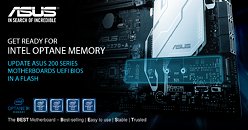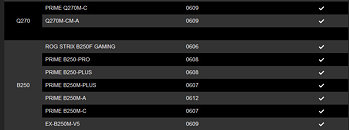Raevenlord
News Editor
- Joined
- Aug 12, 2016
- Messages
- 3,755 (1.20/day)
- Location
- Portugal
| System Name | The Ryzening |
|---|---|
| Processor | AMD Ryzen 9 5900X |
| Motherboard | MSI X570 MAG TOMAHAWK |
| Cooling | Lian Li Galahad 360mm AIO |
| Memory | 32 GB G.Skill Trident Z F4-3733 (4x 8 GB) |
| Video Card(s) | Gigabyte RTX 3070 Ti |
| Storage | Boot: Transcend MTE220S 2TB, Kintson A2000 1TB, Seagate Firewolf Pro 14 TB |
| Display(s) | Acer Nitro VG270UP (1440p 144 Hz IPS) |
| Case | Lian Li O11DX Dynamic White |
| Audio Device(s) | iFi Audio Zen DAC |
| Power Supply | Seasonic Focus+ 750 W |
| Mouse | Cooler Master Masterkeys Lite L |
| Keyboard | Cooler Master Masterkeys Lite L |
| Software | Windows 10 x64 |
ASUS has released BIOS updates for its 200-series motherboards (for the Z270, H270, Q270 and B250 chipsets) that brings full official support and compatibility with Intel's Optane products, such as the recently-released cache SSD.
These first Optane drives use the M.2 form factor, and are designed to be used as ultra-fast caching drives for slower, HDD-class storage - a case of having your cake and eating it too, looking to ally the speed benefits of an SSD with the capacious storage space of traditional plater-based storage. Intel says an Optane-cached 1TB hard disk (at 7,200 rpm) will become twice as responsive when performing daily computing tasks or booting up, and can reduce the time it takes for a game to launch (or level to load) by around the 65% mark. A pure SSD solution will always be faster - and usually more predictable - than the Optane-cached HDD, but Intel's Optane solutions offer a tempting option in terms of a cost-effective speed boost (a 16GB module goes for around $44.)



View at TechPowerUp Main Site
These first Optane drives use the M.2 form factor, and are designed to be used as ultra-fast caching drives for slower, HDD-class storage - a case of having your cake and eating it too, looking to ally the speed benefits of an SSD with the capacious storage space of traditional plater-based storage. Intel says an Optane-cached 1TB hard disk (at 7,200 rpm) will become twice as responsive when performing daily computing tasks or booting up, and can reduce the time it takes for a game to launch (or level to load) by around the 65% mark. A pure SSD solution will always be faster - and usually more predictable - than the Optane-cached HDD, but Intel's Optane solutions offer a tempting option in terms of a cost-effective speed boost (a 16GB module goes for around $44.)



View at TechPowerUp Main Site

